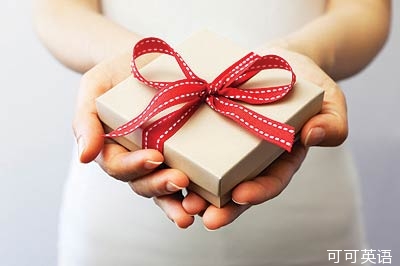(单词翻译:单击)

Another year has almost passed. New Year is not only about endless partying, it’s also the time we all prepare to put some thought (and money) into choosing the perfect gift for our friends, and hope that they will appreciate it.
又值岁末。新年不仅仅是个无休止的派对时间,也是一个礼物选购季——我们花费思、掏腰包为朋友们挑选完美礼物,并希望他们喜欢。
Giving gifts can be risky. Not everyone likes everything, and some people are very vocal about expressing their dislike. Relationships, especially new ones, are particularly fraught with gift-giving difficulties because you haven’t reached a point of mutual directness in terms of what you dislike about each other.
送礼可能是件冒险的事。并非每个人都不挑剔,有些人会喋喋不休地表达自己的不满。情侣们,尤其是那些刚刚牵手的情侣,挑选礼物对他们而言尤为棘手,因为你们的关系还没有熟到可以直接表达不满。
So, how do you give gifts the right way? There’s some science to it, Sumathi Reddy wrote in The Wall Street Journal, and it may help you be a more successful giver of gifts. Here are some relevant points to consider:
那么你如何才能选对礼物呢?这里面大有学问。苏马蒂•雷迪在《华尔街日报》的文章中道出了一些送礼的学问,可能有助于你变身为“送礼达人”。下面是一些送礼时可供参考的要点:
Re-gift without guilt
转送礼物,无需内疚
According to a recent study published in Psychological Science, the original gift giver is less likely to be offended by your thankless re-gifting than you might think. If you have a pile of gifts you hate, go ahead and get rid of them.
《心理科学》最新刊登的一项研究显示,最初的送礼人并不会像你想的那样,因为你这种看似辜负他人心意的转送行为而生气。如果你想借机“处理”掉那些你不喜欢的礼物,大胆去送吧。
The original gift giver might not be angry, or at least less than you’d think. “The reason people weren’t overly bothered when their gifts were later re-gifted was because they generally believed the recipient was free to decide what to do with an item,” Reddy wrote.
最初送礼物的人可能并不生气,或者至少不像你想的那般生气。雷迪写道:“人们并不会特别介意自己送出的礼物被转送,因为他们普遍认为收礼者有权决定如何利用这些礼物。”
The thought doesn’t count
关键不在心意
It’s actually the gift that counts, and not the thought behind it, according to the study. “The benefit of a thoughtful gift actually accrues mainly to the giver, who derives a feeling of closeness to the other person,” columnist Jen Doll wrote in the Atlantic Wire.
该项研究显示,关键不在于送礼者的心意,而在于礼物本身。《大西洋线报》的专栏作家珍•多尔写道:“一份花尽心思的礼物,主要受益者则是送礼者,他们因此觉得和他人之间更加亲密。”
Doesn’t that turn the tables nicely? Those people adamant about giving thoughtful gifts are just selfish jerks, while the rest of us materialists are gift-giving the right way. “In fact, thoughtfulness only seemed to count when a friend gives a gift that is disliked,” Reddy explained. The thought and the gift both being bad seems the key scenario to avoid here.
是否感觉局面巧妙地出现扭转?那些执着于送心意的人是自私的傻瓜,而其他实用享乐主义者却送对了礼物。雷迪解释说,“实际上,只有在朋友给你一件你不喜欢的礼物时,你才会体谅他的心意。”礼物不周同时心意又不到似乎是送礼的头号禁忌。
Money can’t buy happiness
金钱买不来快乐
Well, this is obvious, especially for a New Year’s gift. If you overspend on a New Year’s gift, close friends and family members will say: “Why not wait until my birthday for such a big gift?” And if you buy an expensive gift for a new friend, they might just feel pressured.
好吧,这一点显而易见,尤其对于新年礼物而言。如果你在新年礼物上砸下血本,好友和家人可能会说:“这种大礼,应该等到我过生日时再送嘛。”如果你给一个新朋友买了件大礼,他们可能只是会觉得很有压力。
What’s more, just because you spend a lot of money on a gift doesn’t mean people are going to like it more, or like it at all. So don’t bother spending a lot of money–unless someone explicitly asks you to.
此外,你在礼物上花了许多钱,这并不意味着人们就会更喜欢它,或者完全买你的账。因此,不要花大价钱来买礼物,除非有人明确要求你这样做。
Give people what they actually ask for
投其所好
One might think there is no need for scientists to prove this, but they have, and so we thank them. “People are more appreciative when they receive a gift they have explicitly requested”, said a study published last year in the Journal of Experimental Social Psychology.
你可能以为科学家没必要去验证这一点,但是他们的确这样做了,我们应当感谢他们。去年刊登在《实验社会心理学期刊》的一份研究报告显示:“人们收到之前明确表示过想要的礼物时,会更感动”。
Well, what’d you know? When your best friend asked for an iPod you should have given them the Apple product and not the cheap copy that broke immediately.
好吧,你现在知道了?当你最好的朋友想要iPod时,你就应该给他们买苹果的iPod,而不是易坏的山寨货。


